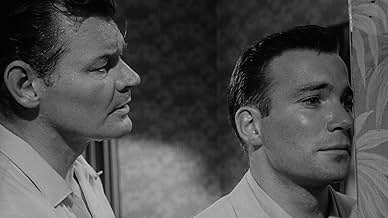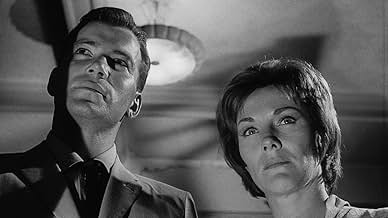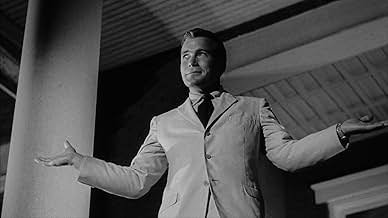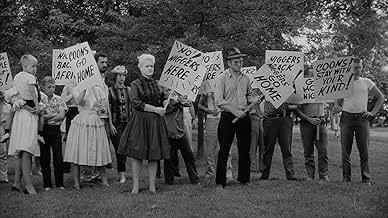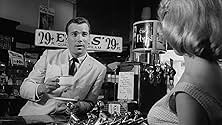The Intruder
- 1962
- Tous publics
- 1h 24min
Ajouter une intrigue dans votre langueA charismatic "social reformer" rallies the white populace of a Southern town to oppose school integration, but he soon finds himself in a situation that he cannot control.A charismatic "social reformer" rallies the white populace of a Southern town to oppose school integration, but he soon finds himself in a situation that he cannot control.A charismatic "social reformer" rallies the white populace of a Southern town to oppose school integration, but he soon finds himself in a situation that he cannot control.
- Réalisation
- Scénario
- Casting principal
- Bart Carey
- (as William Nolan)
- Jack Allardyce
- (as O.C. Ritch)
- Old Hotel Clerk
- (voix)
- (non confirmé)
- Billy Lee
- (non crédité)
Avis à la une
Enter Adam Cramer (Shatner), a representative from Washington of the Patrick Henry Society. He claims to be a social worker, but it turns out that this society is a racist organization opposed to desegregation. Cramer hopes to interfere with the court-ordered policy and begins to stir up the community with fiery rhetoric and bold tactics. Cramer soon discovers that the mob he has helped create is beyond is ability to control.
"The Intruder" is a little known film written by Charles Beaumont (a core writer for "The Twilight Zone" and a screenwriter for many of American International's classic 1960s horror films) and directed by Roger Corman. It shouldn't be little known. This is arguably the best and most important film ever made by Corman and perhaps by Beaumont as well. Shatner puts in a sterling performance as the racist Cramer and the supporting cast, which included both veteran actors and local citizens from the town of Charleston, Missouri (where it was filmed), is also excellent. Corman and Beaumont took on some seriously volatile subject matter and used both tact and intelligence to tell a story and send a message. For those who are more sensitive to racist language or who are caught up with political correctness, "The Intruder" might be somewhat abrasive or uncomfortable to watch. Personally, I think that this would be ideal for viewing in high schools and colleges that are studying the subject of racism and integration in the United States. Regardless, for those seeking a well made, well acted film
Extremely bold and brutally honest portrayal of race relations in the South in the early 60's when the film was made. By viewing it I can see it must have been way too inflammatory for its time. Yet, some parts of this flim made me kind of tense/uncomfortable. Therefore, I don't see it getting wide acceptance in today's politically correct world either.
Despite this, the film's theme and moral messages are ageless. The script is so intelligently written coupled with Shatner's convincing performance, I was not given impression that this is considered a "B" movie. OK, well maybe there are a few scenes that may indicate that but they are outnumbered by the compelling drama throughout the film. The final 5 to 10 minutes are particularly tense which may actually be hard to watch.
A commendable effort, I had no regrets in plucking down a few bucks to buy this flick.
So forty years later I watched the Intruder. It left me cold and I begin remembering that trip to the South so long ago. Sitting here in my easy chair in South Carolina today, I can say that some things have changed and some things haven't.
The movie, at least from my experience, presents a milieu that is faithfully true of the South in the early '60's. Of course, it descends from that point into the murky depths of the manipulation of fear and hatred within the human spirit. It is a raw, dramatic expose - hard to watch at times. And I can't respect enough that this movie is so cutting edge and so truly represents the attitudes and motivations of folks during those days.
For the adventurer who has a curiosity of how life was in that period, and for the psychology buff who is interested in the roots of human nature, this movie is a must.
dnk
This is Corman's most painstakingly worked-out film, which is why it is so powerful, suggesting, like Lang, a set of mathematical propositions that seem simple but, add up to a theorem that seems to negate mathematical principles of logic, order etc. As in a Lang film, there is no 'hero' to root for - the lead here is a sinister right-winger linked to the KKK who arrives in an archetypal Southern town to stir up race hatred. He is given the conventional Hollywood hero treatment: the opening credits set up his point of view, establishing his way of looking at the world.
But even over these credits, Corman confuses us. At first we think he's a solitary figure, it is him alone we see entering the town and looking at it. Then he comes out with a woman and child, and we assume he's a family man, but that turns out to be wrong too. So, in these opening scenes we are presented with a lead character in the conventional manner, but, unconventionally, we are unable to get a grip on him.
Similarly, in spite of the title and the menacing opening music, Cramer's good manners and charm continue to suggest him as a hero, even though he is trying to stir up racist feeling, especially when compared to the next significant male character, a loud braggart who appears to be raping his nymphomaniac wife. In this first third, there are no sides drawn, we might almost be watching a racist film, such is Cramer's conventional heroic status. He even seems a movie star, with his dark shades and good looks, which Corman plays on ironically in the scenes of demagogary and when his 'fans' protest his jailing.
Like Lang, Corman switches point of view disturbingly and decisively. This opening out of point of view makes clear the issues, and in a way that conventional Hollywood cinema of the time could not conceive. The reason films like this were considered 'B' or exploitation is because they were telling truths that official Hollywood didn't even know existed. How many contemporary Hollywood films were even dealing with these issues, never mind as provocatively and intelligently as this one? When they finally got round to it, it was cosy liberal kramergloop.
There is no flip solution here - the moral centre is a moderate racist who is nearly killed for his growing ethical awareness (the newspaper editor) - other liberals are shown to be almost criminally useless. Corman asks questions with no easy answers - how do you enforce progressive laws? how do you hold back a mob without becoming as reactionary as them? Cramer, influenced by Lenin as much as Hitler, makes his appeals to democracy and freedom, and Corman forces us to admit that he is right, to reconsider what we mean by these concepts. This is a stunning film, full of tense calm giving onto explosions of harrowing violence, with an insight into its roots in sexual neurosis, including a sequence where the KKK come into town like an invading army, a huge cross like a tank turret, ready to be burned; a lynch sequence as shocking as Huck Finn or 'The Ox-bow Incident'.
Along with the unusual, Langian clarity of the monochrome imagery, note the grids on or around Cramer - crossed telegraph wires, the bars of the hotel lobby etc. - culminating in the demand for the accursed rapist behind a grilled window, like a frothing beast; or the childlike immaturity of the racists, whose hatred centres around the school's swing. The frightening 'speech' scene, outside a monumental civic building, in Nuremberg-like lighting, is more potent than anything in 'All the King's Men'.
I know that this film didn't cost much to make because it was directed by Roger Corman, but if you didn't know that; you'd never have guessed. There are no big stunts in the film, but the production values are surprisingly high and the acting surprisingly good. The Intruder is bolstered by an excellent performance from William Shatner. Corman apparently blamed the poor box office run on Shatner - but I have no idea why! Shatner does a great job of providing a great portrait of his character - suitably slimy, yet obviously cowardly beneath his confidant public persona. Perhaps the best thing about this film is its simplicity. Bigger films such as American History X have attempted to make a point about racism with not as much success as Corman has here. The scenes that show the crowds really getting behind Cramer's words of hatred are poignant indeed, and the conclusion to the tale both makes a point about bigots and provides a suitable conclusion to Adam Cramer's character arc. Overall, The Intruder is one of the best and most though-provoking films on the tentative subject of racism that I have ever seen, and it comes highly recommended to all!
Le saviez-vous
- AnecdotesAfter the crew was thrown out of East Prairie, MO, by the chief of police (for allegedly being "communists"), Roger Corman realized that he needed one more wide shot of the high school. He and an assistant went back into the town and hurriedly filmed the shot. The chief must have gotten wind of his being there, as he was seen by Corman arriving in the distance. Corman and his assistant quickly threw the camera and equipment into their car, and sped away in the opposite direction, unscathed.
- GaffesAt the beginning of Adam Cramer's speech in front of the town hall, he unbuttons his jacket twice.
- Citations
[last lines]
Sam Griffin: [to Adam Cramer] Boy, you're gonna get grass stains all over those trousers you don't get up. Come on. That's better. I figure your work in this town's about over. If you hurry, you can catch the bus to Farragut. They got trains there. If you're a little light on travelin' money, I'd be proud to... You're sure, now? Oh, I almost forgot. These belong to you. I wouldn't wanna steal from you, boy.
- ConnexionsFeatured in Some Nudity Required (1998)
Meilleurs choix
- How long is The Intruder?Alimenté par Alexa
Détails
Box-office
- Budget
- 90 000 $US (estimé)
- Durée1 heure 24 minutes
- Couleur
- Mixage
- Rapport de forme
- 1.85 : 1
Contribuer à cette page



